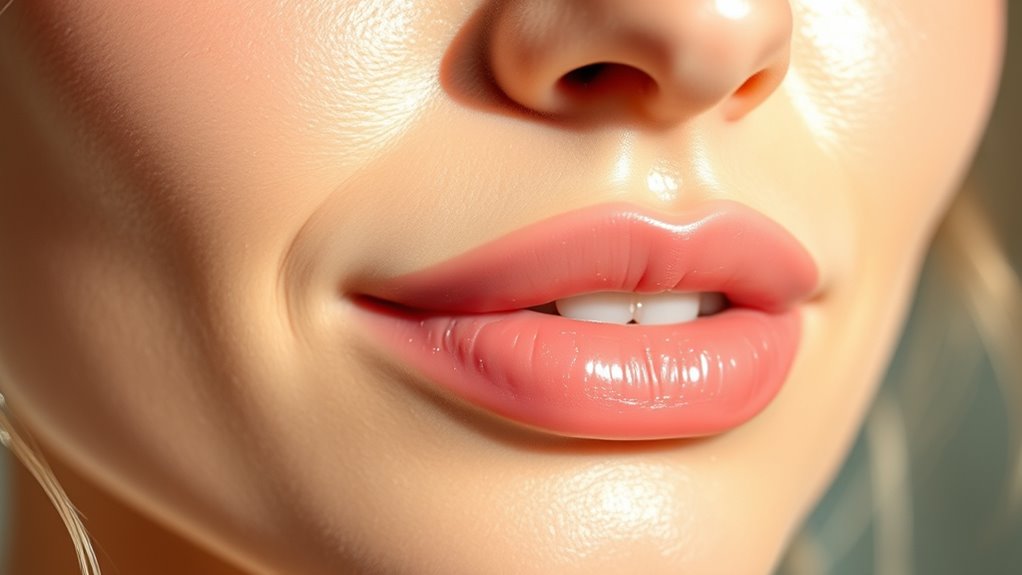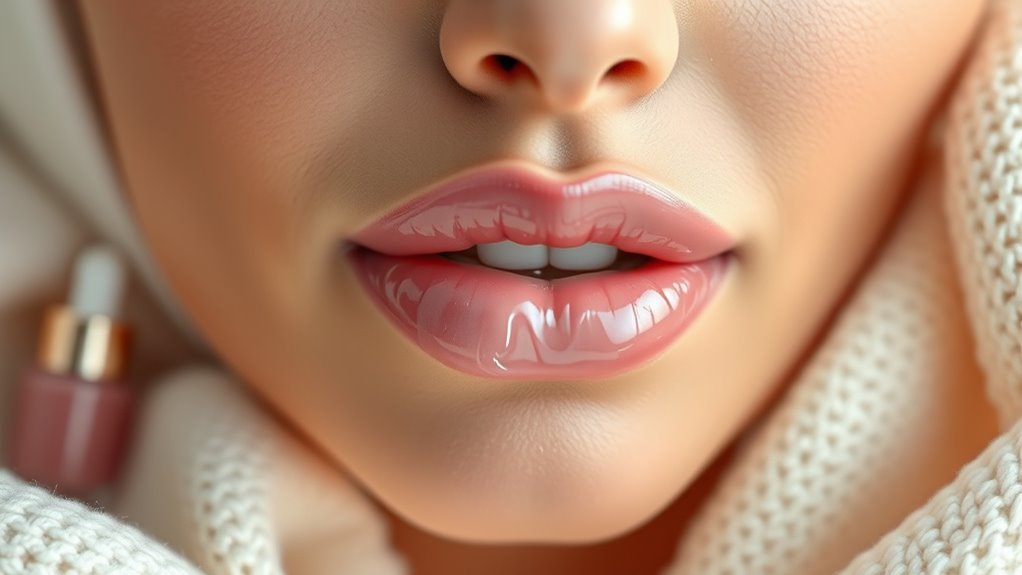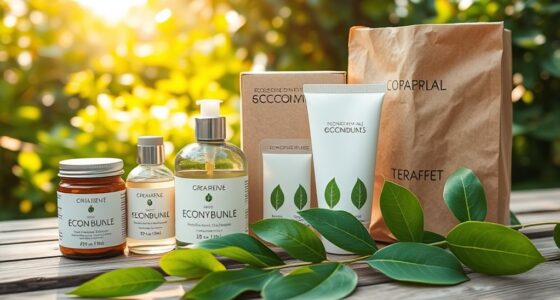Hydration masks have become popular because they deeply nourish and protect your delicate lips, making them softer, plumper, and healthier. Regular use helps remove dead skin, boost moisture, and improve texture and elasticity. Natural ingredients like honey, aloe vera, and jojoba oil make these masks gentle and effective. If you want to learn how to elevate your lip care routine naturally, keep exploring the best tips and ingredients for lasting results.
Key Takeaways
- Lip hydration masks boost moisture, smoothness, and plumpness, making lips look youthful and healthy.
- Incorporating natural ingredients ensures gentle, effective care without harmful chemicals.
- Regular lip exfoliation enhances mask absorption and improves overall lip texture.
- Long-term use of natural masks maintains hydrated, resilient, and irritation-free lips.
- Lip care is becoming a key part of skincare routines due to its visible impact on overall facial aesthetics.

Hydration masks for lips are a game-changer for anyone looking to boost moisture and smoothness. If you want soft, plump lips, incorporating a hydration mask into your routine is a must. Before applying the mask, it’s essential to prep your lips properly, and that’s where lip exfoliation comes in. Gentle exfoliation helps remove dead skin cells, revealing a fresh layer underneath. Using natural ingredients for this step not only ensures a gentle approach but also adds nourishing benefits. Think of ingredients like honey, sugar, or coconut oil—they’re naturally soothing and can be easily mixed into homemade scrubs. When you exfoliate regularly, your lips become more receptive to hydration masks, allowing active ingredients to penetrate deeper and work more effectively.
Once your lips are exfoliated, applying a hydration mask is the next step. These masks are designed to deliver intense moisture, often containing ingredients like hyaluronic acid, aloe vera, or shea butter. But for a truly natural routine, look for masks with plant-based extracts or oils, such as chamomile or jojoba oil. These ingredients not only hydrate but also soothe and calm irritated lips. The beauty of using natural ingredients is that they’re gentle yet effective, making them suitable even for sensitive skin. When you apply your mask, make sure to cover every inch of your lips and leave it on for the recommended time to maximize benefits. During this period, you can relax knowing you’re nourishing your lips with pure, wholesome ingredients.
Incorporating natural ingredients into your lip care routine isn’t just about comfort—it also helps you avoid synthetic chemicals often found in commercial products. Natural ingredients tend to be free from parabens, sulfates, and artificial fragrances, making your routine safer and more environmentally friendly. Plus, many natural options are budget-friendly and easy to find in your kitchen. For example, you can create a quick hydrating mask using honey and coconut oil, which both have exceptional moisturizing properties. Regular use of these masks will improve the texture, elasticity, and overall health of your lips. Over time, you’ll notice your lips feel smoother, plumper, and more resilient against environmental stressors.
Frequently Asked Questions
How Often Should I Use a Hydration Mask for My Lips?
You should use a hydration mask for your lips 2 to 3 times a week for ideal results. The best time to use it is after cleansing your face or before bed, allowing the mask to deeply hydrate while you relax. Adjust the application frequency based on your lips’ dryness; if they’re very chapped, increase usage temporarily. Consistency keeps your lips soft and moisturized, enhancing your overall skincare routine.
Can Hydration Masks Help With Chapped or Cracked Lips?
Sure, hydration masks can rescue your chapped or cracked lips—think of them as your skin’s superhero sidekick. They soothe and repair, especially when paired with lip exfoliation to remove dead skin and sun protection to prevent further damage. Use them regularly, and you’ll avoid the “why does my lipstick feel like sandpaper?” dilemma. Your lips will thank you with a smooth, plump pout—no more excuses for neglect!
Are Hydration Masks Suitable for Sensitive or Allergic Skin?
Yes, hydration masks can be suitable for sensitive or allergic skin if they contain hypoallergenic formulations. To guarantee they won’t cause a reaction, you should always perform patch testing first. Look for masks labeled as hypoallergenic, and apply a small amount on your skin to check for irritation. If no redness or swelling occurs within 24 hours, you’re likely safe to use the mask regularly for soft, hydrated lips.
What Ingredients Should I Look for in a Lip Hydration Mask?
Look for lip hydration masks with safe, nourishing ingredients like shea butter, hyaluronic acid, and aloe vera, which hydrate and soothe your lips. If you want a plumping effect, choose products with natural ingredients like cinnamon or peppermint, but guarantee they’re gentle to avoid irritation. Always check ingredient safety, especially if you have sensitive skin. These ingredients help you achieve soft, healthy, and plump lips safely.
Can Lip Masks Be Combined With Other Lip Care Products?
Yes, you can combine lip masks with other lip care products. To do so, use layering techniques—apply a hydrating lip mask first, then follow with balms or oils for added moisture. Guarantee product compatibility by choosing gentle, compatible formulas, and avoid overloading your lips with too many products at once. This layering approach enhances hydration, keeps lips luscious, and maximizes the benefits of your lip care routine.
Conclusion
Think of hydration masks for your lips as a gentle rain shower, reviving and nourishing your skin like a lush garden after a dry spell. When you embrace this lip care ritual, you’re not just adding moisture—you’re planting the seeds for soft, plump, and radiant lips that speak volumes without a single word. So, let your lips bask in this hydrating bliss, turning every smile into a luminous, irresistible bloom.









